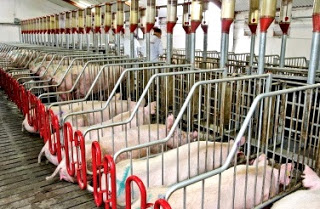It seems like almost every month another food service provider
breaks with the news that they are going to be phasing out gestation stalls. I
havescoured searched a little bit on the internet for a succinct list of all these food companies but
haven’t been very successful. Then I thought to myself, “Self, I bet there are
other people who would like to know this information – you should find and
combine all of this for the folks on the internet to find.” So here is my list.
I may not have found all of them but if you know of one I have missed, please
let me know and I’ll keep the list updated!
breaks with the news that they are going to be phasing out gestation stalls. I
have
haven’t been very successful. Then I thought to myself, “Self, I bet there are
other people who would like to know this information – you should find and
combine all of this for the folks on the internet to find.” So here is my list.
I may not have found all of them but if you know of one I have missed, please
let me know and I’ll keep the list updated!
These are the companies who have committed to sourcing pork from producers who don’t use gestation stalls or are phasing them out of their own facilities:
|
||||||||||||||||||||||||||||||||||||||||||||||||||||||
|
Not only have these food service companies decided to
phase out gestation stalls, there are nine states – Arizona, California, Colorado, Florida, Maine, Michigan, Ohio, Oregon and Rhode Island – who have already passed laws to ban the use of gestation crates from pork supply chain practices.
Unfortunately,
I don’t see this pattern of phasing out gestation crates ending anytime soon. So, until the next company issues a press release here is the list. Again, please let me know if I missed any.
Until next time,
~ Buzzard ~
|
||||||||||||||||||||||||||||||||||||||||||||||||||||||




